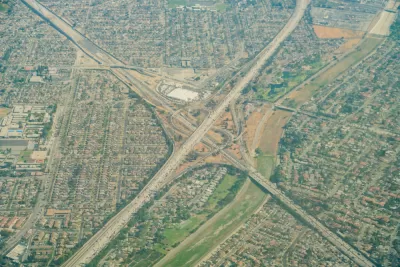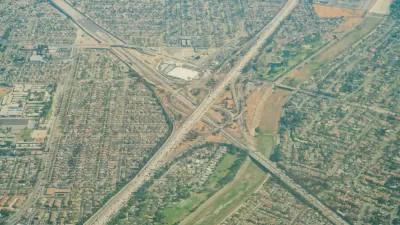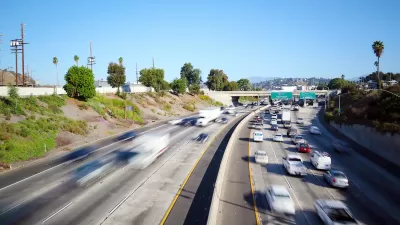Political opposition to the controversial I-605 Corridor Improvement Project is gaining traction on the Los Angeles County Metropolitan Transportation Authority Board of Directors.

The Los Angeles County Metropolitan Transportation Authority (Metro) Board of Directors hit the brakes on a controversial freeway widening project proposed for Interstate 605 and intersecting sections of interstates 5, 10, and 105 in addition to California State Route 60.

The Metro board unanimously approved a motion to delay the I-605 Freeway Corridor Improvement Project "and to study alternatives that would minimize the demolition of homes," reports Joe Linton.
According to Linton, "Metro’s official statements, including a September 29 letter from CEO Phil Washington, have been largely dismissive" of negative feedback on the project. The Gateway Cities Council of Governments (GCCOG) and the city of Downey are two local jurisdictions cited by Linton as examples of community opposition to I-605 Corridor Improvement Project. The Metro Board of Directors, however, responded to that feedback. Linton provides more detail about the board's actions:
Last week, six boardmembers put forth a motion that delays the release of the project environmental studies (draft Environmental Impact Statement/Environmental Impact Report – dEIR/EIS) until after Metro staff study more alternatives. The motion specified that those alternatives will include one that “minimizes right-of-way impacts” and/or a “Transportation System/Demand Management (TSM/TDM) alternative” similar to what the board approved in place of the canceled $6 billion North 710 Freeway tunnel project through South Pasadena.
Linton also provides details of the widespread opposition to the project expressed by members of the board.
FULL STORY: Metro Board Unanimously Approves Motion to Delay 605/5 Freeway Widening and Instead Study Alternatives

Alabama: Trump Terminates Settlements for Black Communities Harmed By Raw Sewage
Trump deemed the landmark civil rights agreement “illegal DEI and environmental justice policy.”

Planetizen Federal Action Tracker
A weekly monitor of how Trump’s orders and actions are impacting planners and planning in America.

Why Should We Subsidize Public Transportation?
Many public transit agencies face financial stress due to rising costs, declining fare revenue, and declining subsidies. Transit advocates must provide a strong business case for increasing public transit funding.

Understanding Road Diets
An explainer from Momentum highlights the advantages of reducing vehicle lanes in favor of more bike, transit, and pedestrian infrastructure.

New California Law Regulates Warehouse Pollution
A new law tightens building and emissions regulations for large distribution warehouses to mitigate air pollution and traffic in surrounding communities.

Phoenix Announces Opening Date for Light Rail Extension
The South Central extension will connect South Phoenix to downtown and other major hubs starting on June 7.
Urban Design for Planners 1: Software Tools
This six-course series explores essential urban design concepts using open source software and equips planners with the tools they need to participate fully in the urban design process.
Planning for Universal Design
Learn the tools for implementing Universal Design in planning regulations.
Caltrans
Smith Gee Studio
Institute for Housing and Urban Development Studies (IHS)
City of Grandview
Harvard GSD Executive Education
Toledo-Lucas County Plan Commissions
Salt Lake City
NYU Wagner Graduate School of Public Service





























